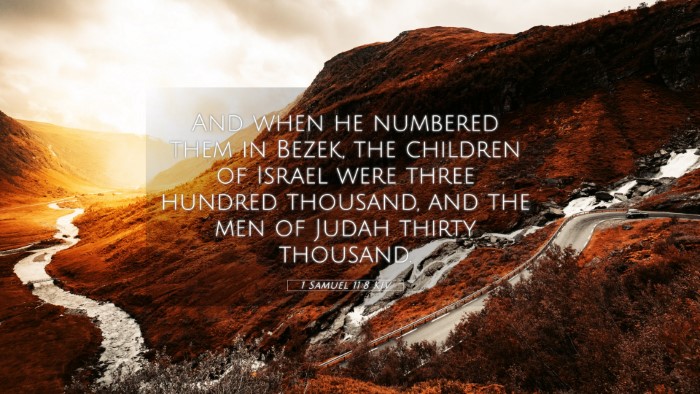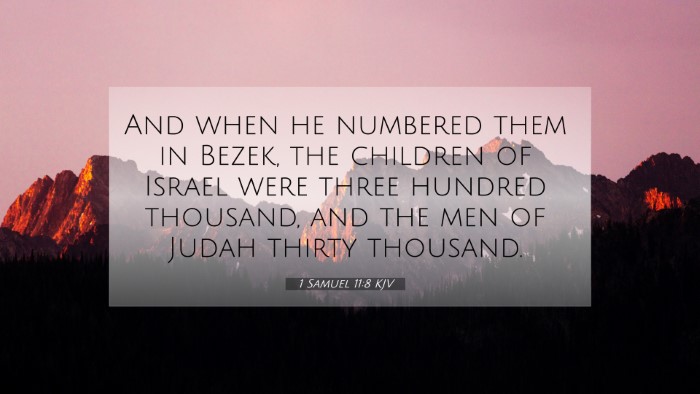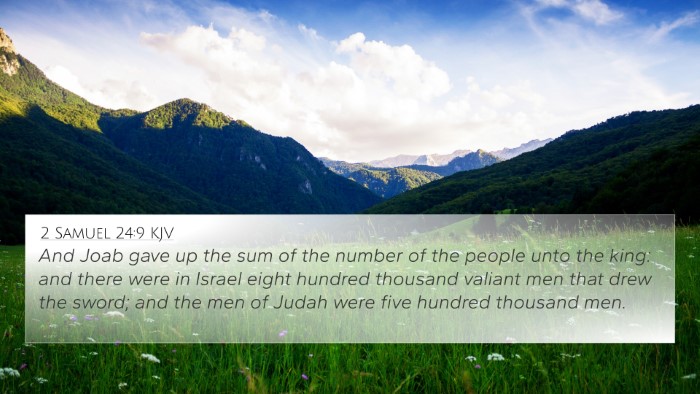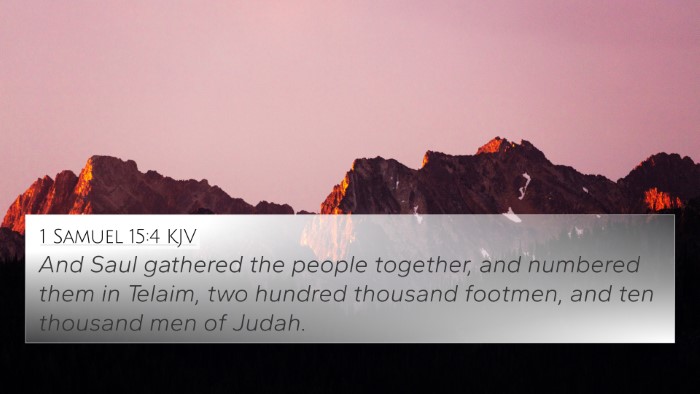Understanding 1 Samuel 11:8
1 Samuel 11:8 reads: "And he numbered them in Bezek; and the children of Israel were three hundred thousand, and the men of Judah thirty thousand." This verse marks a significant moment in Israel's history as they prepare to face a dire threat.
Meaning and Context
This verse occurs within the broader narrative of Saul's emergence as a leader of Israel, following a period of oppression by the Ammonites. The gathering of the troops demonstrates the unity and readiness of the Israelite people in response to a common enemy, showcasing their collective resolve.
- Matthew Henry's Commentary: Henry emphasizes the importance of collective action. The numbering of troops illustrates not only the strength of Israel but also God's providential hand in their mobilization against adversaries.
- Albert Barnes' Notes: Barnes notes that the gatherings at Bezek signal an organized response among the tribes, which reflects both their desperation and determination for liberation. He comments on the significance of numbers in the context of ancient warfare.
- Adam Clarke's Commentary: Clarke elaborates on the symbolic nature of the phrasing in this verse, suggesting it serves to highlight not just the quantity of men but also their enthusiasm and commitment to the battle ahead.
Thematic Connections
The themes presented in this verse connect with several other passages in the Bible that reflect on themes of unity, divine assistance, and the importance of leadership.
- Judges 6:34 - The Spirit of the Lord came upon Gideon, echoing the divine empowerment seen in Saul’s calling.
- 1 Chronicles 12:1-2 - Chronicles recounts the gathering of warriors to David, mirroring the allegiance seen in 1 Samuel.
- Exodus 12:51 - The emphasis on collective action during the Exodus parallels the unity in facing threats.
- Psalm 68:1-2 - The call for God to arise can be seen in Israel's plea for divine intervention against their adversaries.
- Romans 15:5-6 - New Testament reflections on unity among believers resonate with the importance of collective effort demonstrated in this passage.
- Hebrews 10:24-25 - Spurring one another to good works and fellowship reflects the community aspect evident in Israel’s response to the Ammonites.
- 1 Corinthians 1:10 - The appeal for unity among Christians connects with the concerted effort of Israelites gathered to stand against oppression.
Cross-Referencing Biblical Texts
Understanding 1 Samuel 11:8 can be enriched through various cross-references and thematic connections that weave through Scripture:
- 1 Samuel 10:20-24 - The context of Saul being chosen as king precedes the gathering of troops.
- Isaiah 11:12 - The notion of gathering is seen in prophetic visions regarding the restoration of Israel.
- Matthew 28:19-20 - The Great Commission parallels the call to gather and act together for a common purpose.
- Acts 4:32 - The unity of believers in the early church reflects back to Israel’s collective efforts.
Conclusion
1 Samuel 11:8 exemplifies the process of mobilization as a reflection of leadership and community spirit in times of crisis. The understanding of this verse, enriched through public domain commentaries and cross-referencing biblical texts, underscores the significance of unity and divine guidance in both the Old and New Testaments.
Further Exploration
For those interested in exploring Bible verses related to this theme, consider how unity and divine assistance play out across Scripture.
Using tools for Bible cross-referencing can aid in discovering connections between these scriptures effectively:
- Bible Concordance - A resource for finding specific words and themes across the Bible.
- Bible Cross-Reference Guide - A structured means of examining related passages.
- Cross-Reference Bible Study - Methods to deepen understanding through thematic exploration.
In conclusion, as you further your study, explore how these cross-references can provide deeper insights into not only the narrative of 1 Samuel but also the overarching themes of scripture that connect different books and verses.








